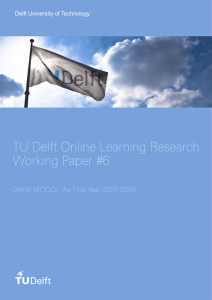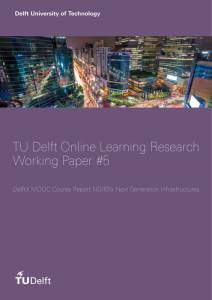Posts in category Reports
Debugging the Divide: Exploring Men’s and Women’s Motivations and Engagement in Computer Science MOOCs
Master thesis written by Casper Hildebrand at the faculty Electrical Engineering, Mathematics and Computer Science to obtain the degree of Master of Science at the Delft University of Technology.
Summary
Within the field of computer science (CS), women are under-represented in the workforce and education settings. As Massive Open Online Courses (MOOCs) grow in popularity, understanding the gender differences in reasons for enrollment and engagement remains crucial to improving learner outcomes. This study investigates why men and women enroll in introductory CS MOOCs and how they interact with these courses. This is done with data from four MOOCs offered by TU Delft between 2015 and 2022.
Using survey data for the learners’ reasons for enrolment and clickstream data for their behavioural engagement, we applied k-means clustering to identify engagement patterns. Our analysis reveals that the three most important reasons for men and women are career-related, interest-related, and degree-related, in that order. Women are more likely to enrol for career-related reasons than men, while men are more driven by interest in the topic than women. Women also tend to show lower engagement levels compared to men, who are more likely to complete the courses. We found no significant association between reasons for enrollment and engagement for men and women.
These findings highlight the need for gender-sensitive course design strategies to enhance engagement and completion rates. Providing mentorship opportunities, fostering peer interaction platforms, and highlighting role models in the field could also help create a more inclusive learning environment. Future research should explore specific learner challenges and incorporate a more comprehensive engagement model.
Keywords
Gender diversity, online learning, computer science, MOOCS, continuing education, motivation, engagement
Reference
Hildebrand, C.W.R. (2024) DEBUGGING THE DIVIDE: EXPLORING MEN’S AND WOMEN’S MOTIVATIONS AND ENGAGEMENT IN COMPUTER SCIENCE MOOCS Master thesis at the TU Delft faculty Electrical Engineering, Mathematics and Computer Science
http://resolver.tudelft.nl/uuid:f4aceeec-5947-4578-834c-4bb43288c91a
Download
Reuse Rights
Other than for strictly personal use, it is not permitted to download, forward or distribute the text or part of it, without the consent of the author(s) and/or copyright holder(s), unless the work is under an open content license such as Creative Commons.
NB: Written consent was obtained from the author before publishing this blogpost.
MOOC Analytics: Learner Modeling and Content Generation
Doctoral thesis of Guanliang Chen, successfully defended on May 6th 2019.
Abstract
Massive Open Online Courses (MOOCs), as one of the popular options for people to receive education and learn, are endowed with the mission to educate the world. Typically, there are two types of MOOC platforms: topic-agnostic and topic-specific. Topic-agnostic platforms such as edX and Coursera provide courses covering a wide range of topics, while topic-specific MOOC platforms such as Duolingo and Codeacademy focus on courses in one specific topic. To better support MOOC learners, many works have been proposed to investigate MOOC learning in the past decade. Still, there are many other aspects of MOOC learning to be explored.In this thesis, we focused on (i) learner modeling and (ii) generation of educational material for both topic-agnostic and topic-specific MOOC platforms.
Keywords
Reference
Download
Large-Scale Learning Analytics: Modeling Learner Behavior & Improving Learning Outcomes in Massive Open Online Courses
Doctoral thesis of Dan Davis defended on May 7th 2019.
Keywords
learning analytics, web information systems, learning science, educational data mining, MOOCs
Reference
Davis, D. (2019). Large-Scale Learning Analytics: Modeling Learner Behavior & Improving Learning Outcomes in Massive Open Online Courses. https://doi.org/10.4233/uuid:b8be8302-84a0-4b29-a6fe- 761a3f872420
Download
Working Paper 4: Introduction to Credit Risk Management 2014
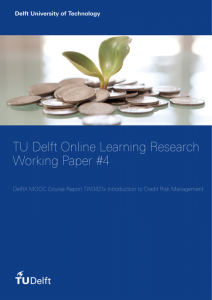 This report is to give more insight in the background, the implementation of the course and the results. The purpose is to provide useful information (and clean data) to the team of developers and teachers and to others to support their aspiration to improve online education. A comparative analysis of the first five DelftX MOOCs can be found in the ‘Working Paper DelftX MOOCs, the first year (2013-2014)’.
This report is to give more insight in the background, the implementation of the course and the results. The purpose is to provide useful information (and clean data) to the team of developers and teachers and to others to support their aspiration to improve online education. A comparative analysis of the first five DelftX MOOCs can be found in the ‘Working Paper DelftX MOOCs, the first year (2013-2014)’.
Working Paper 3: Introduction to Aeronautical Engineering 2014
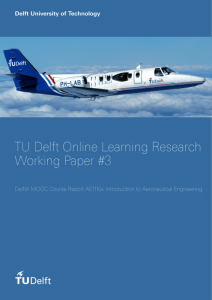 This report is to give more insight in the background, the implementation of the course and the results. The purpose is to provide useful information (and clean data) to the team of developers and teachers and to others to support their aspiration to improve online education. A comparative analysis of the first five DelftX MOOCs can be found in the ‘Working Paper DelftX MOOCs, the first year (2013-2014)’. Continue reading
This report is to give more insight in the background, the implementation of the course and the results. The purpose is to provide useful information (and clean data) to the team of developers and teachers and to others to support their aspiration to improve online education. A comparative analysis of the first five DelftX MOOCs can be found in the ‘Working Paper DelftX MOOCs, the first year (2013-2014)’. Continue reading
Working Paper 2: Introduction to Water Treatment 2013
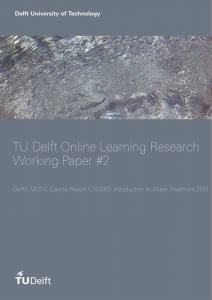 This report is to give more insight in the background, the implementation of the course and the results. The purpose is to provide useful information (and clean data) to the team of developers and teachers and to others to support their aspiration to improve online education. A comparative analysis of the first five DelftX MOOCs can be found in the ‘Working Paper DelftX MOOCs, the first year (2013-2014)’. Continue reading
This report is to give more insight in the background, the implementation of the course and the results. The purpose is to provide useful information (and clean data) to the team of developers and teachers and to others to support their aspiration to improve online education. A comparative analysis of the first five DelftX MOOCs can be found in the ‘Working Paper DelftX MOOCs, the first year (2013-2014)’. Continue reading
Working Paper 1: Solar Energy 2013
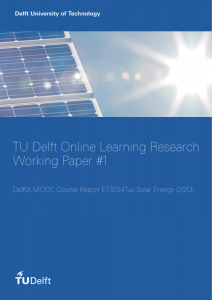 This report is to give more insight in the background, the implementation of the course and the results. The purpose is to provide useful information (and clean data) to the team of developers and teachers and to others to support their aspiration to improve online education. A comparative analysis of the first five DelftX MOOCs can be found in the ‘Working Paper DelftX MOOCs, the first year (2013-2014)’. Continue reading
This report is to give more insight in the background, the implementation of the course and the results. The purpose is to provide useful information (and clean data) to the team of developers and teachers and to others to support their aspiration to improve online education. A comparative analysis of the first five DelftX MOOCs can be found in the ‘Working Paper DelftX MOOCs, the first year (2013-2014)’. Continue reading

